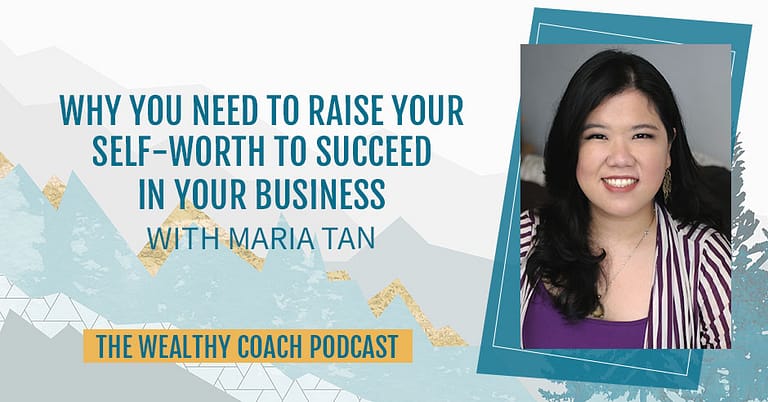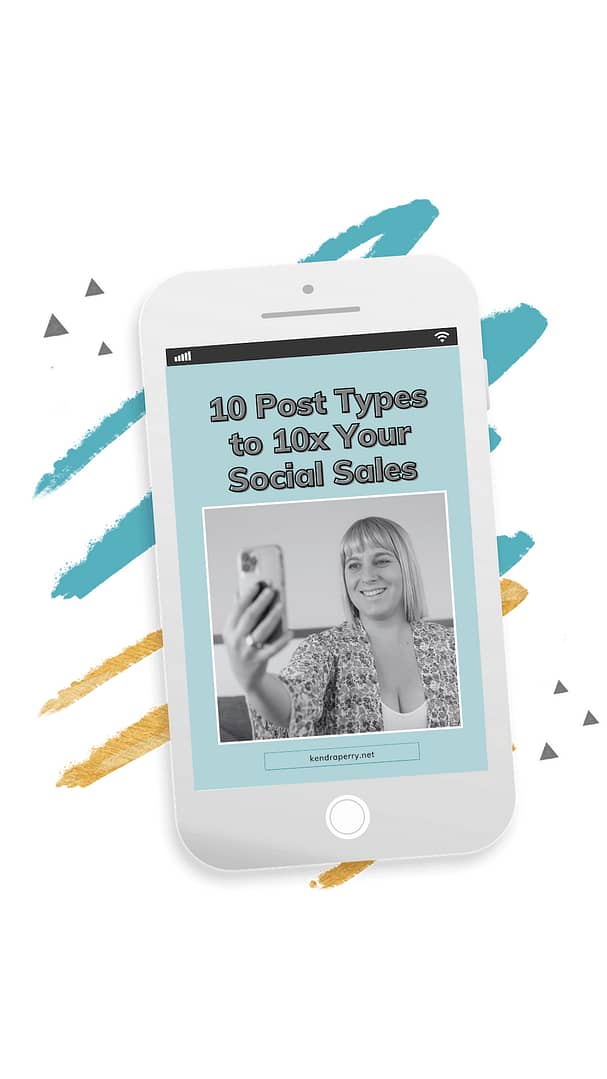If you want to make good money, then you need to raise your self-worth. Kendra Perry introduces Maria Tan, known as THE Business Coach for Misfits. Maria explains that if you don’t feel good about yourself as a new entrepreneur, there is no way that you can make good money. Plus, you may give up too soon when you’re just starting out. But you see, the only way you really fail in businesses is when you give up. So you have to be firm in your self-worth separate from your business. Tune in to learn more!
—
Listen to the podcast here
Why You Need To Raise Your Self-Worth To Succeed In Your Business With Maria Tan
I’m stoked because I’m hanging out with Maria Tan and we are talking about the magical, beautiful intersection between self-worth, money, and business. This is a big thing. A lot of people don’t realize that when they start a business that it can be a triggering and uncomfortable experience. Businesses don’t get grown in your comfort zone. When you’re in your discomfort, a lot of things can come up.
A thing that a lot of us do, and I did this too, is we tie our entire self-worth into our business. We make ourselves our business and what ultimately ends up happening is when things don’t go wrong, it ends up meaning something about us. It’s like an attack on ourselves. When I was doing this, I had a launch that didn’t go well, where I got rejected on a sales call or whatever it was. It would lead to this dialogue where I was telling myself, “I sucked. I wasn’t good enough. What business did I have doing this?” Maybe this can sound a little bit familiar to you now. A lot of us go through this.
Maria is going to shed some light on self-worth, business, and money. We’re going to go through a very fun conversation about that. She’s going to give you some actionable tips and strategies to help cultivate and build that self-worth that will serve you, not only in your business but also in your life. I’m very excited about this conversation.
A little bit more about Maria. She is known as the Business Coach for Misfits. She empowers nonconformance across the globe to embrace the magic of running your own business and create a success tailored to their lifestyles. Before coaching online, she was a cross-cultural business and communications consultant who worked with executives from all over the world and coached over 1,000 professionals.
She’s been in Forbes Entrepreneur, HuffPost, Elephant Journal, Pick the Brain, and Addicted 2 Success and was the only Asian woman featured in The Money Code and How to Crack It, a book that debuted at number fourteen on Amazon US. Her 1,000-plus clients range from side hustlers to new entrepreneurs to seasoned entrepreneurs. Whether you’re starting to consider becoming your own boss or looking to scale an established business, it’s important to focus and refocus on the crucial components that set you up for success. That is Maria and let’s hop into this amazing episode with her.
—
Maria, welcome to the show.
I am so excited to be here. Thank you for having me.
I am very excited to have you here because we’re talking about a topic that’s probably going to hit home for a lot of the readers, but before we dive into it, can you give the audience a little idea of who you are, what you do, and how you came to do what you do?
My name is Maria and I am known as the Business Coach for Misfits because I specialize in helping what I call nonconformists or multifaceted change-makers create those six-figure business breakthroughs. My journey is such a long story, but to cut it short, I started on my entrepreneurial journey at the age of six. I started consulting at the age of eighteen internationally, but when I was in my mid-twenties, something didn’t feel right despite my long roster of clients, etc.
There was a big gap and that started my journey in realigning my values, authenticity, balance, and what success is. I’m so excited to be jumping into this topic. For me, I started my path early, but we have what I call money traumas, where we’re living a very dysfunctional relationship with money that is causing us to create our own success mishaps and we’re digging the holes and digging deeper into it.
When you start a business, you have no idea how much you can get triggered and personal work will come up. I’d love it if you could explain to the audience a little bit how does self-worth tie into like business and money.
As I said, I started doing business at the age of six.
What were you doing at the age of six?
I come from a very long line of entrepreneurs. I was a type of person that is very odd for an Asian, that’s why I’m a misfit, but I would tell someone that I don’t like something. As kids, my aunts would bring us to arcades, those tokens, you get tickets, and then you exchange those tickets for prices. I love winning, but I hate the prizes in those arcades, so I sell them. In the ’90s, especially in my culture, it’s so different from now, but people love to give gifts. Now, people love to give gift cards, but it was real gifts for kids back then.
I come from a big family and everybody would give me gifts. I hated the gifts they gave me. What I did was I would sell them. I’d sell them to everybody or anybody I meet. “I don’t like this pencil. Why did this person give me this pencil?” It was more of that. I saw business from a young age. It’s supply and demand. I had something that I didn’t want and I wanted something that I didn’t have, like money.
For me, I wanted to play games in arcades. I wanted that money to buy me tokens. It’s more of that. I’m very bad at games, but I love them. We would have a budget. All the kids would have ten tokens and I’d always finish mine very fast. I’d be waiting and looking at all my cousins who are still playing. “I need more tokens,” so it’s basically that.

Going back, you mentioned self-worth. In my case, I achieved monetary material success quite early in my life. It’s very different from everybody in my peers and even in my family. I tied my worth to the amount of money I could make because monetizing came so easy for me and I saw myself as worthy, but then came the moment when what I was doing did not make me feel good anymore. It lost its luster.
At that time, I looked, “Who am I then if I were not the prison making money?” A lot of us take our identities as the only way we live our lives. That’s why a lot of people, especially new entrepreneurs in your audience transitioning into business, find that they’re stuck in that moment where all of a sudden, their whole identity shifted. The beginning of entrepreneurship is not a linear experience. It’s not like corporate where you’re graded on everything. In entrepreneurship, there’s no grade. It’s not like you do three tries and then the fourth one is correct.
It’s always like you become the boss. It’s you take the full responsibility for, “After the fourth try, are we moving forward with this or not? If it failed three times, is it a failure? If it failed ten times, is it the failure?” How you tie your identity with yourself, see yourself, and perceive yourself as special or worthy can make you feel so demoralized that you would question if you can even make it. If you don’t feel good, especially as a new entrepreneur, there is no way that you can make good money.
It’s something I notice a lot in my students that they are making themselves their business. Their business becomes an extension of self. When things don’t go right, they get a no on a sales call, have a launch that doesn’t go right, or not get engagement on social media. There’s this narrative or a story where, “That means I’m not good enough or I suck.”
“I’m a failure.”
You have to separate yourself. My business is one thing, it’s this entity, but I’m not attached to it. If something goes wrong in my business, it doesn’t mean anything about my worthiness.
I agreed to some extent. This is now the thin line that a lot of entrepreneurs, especially creative entrepreneurs and personal brands, have to tread carefully because, on one side, you and your business are separate entities. That’s why there’s an LLC or an S-Corp, or however you file your entity, and then there’s you. Legally, you’re two different entities, but if you think about it, it’s still part of you. Especially when you’re starting, it’s hard to separate the two. The key is understanding that if you hear a no, it doesn’t mean that there are saying no to you, but maybe they are saying no to the circumstance.
If you’re talking about in the beginning, the thing with separating yourself from the business is everybody wants this perfect blueprint of what success and especially balance is. That confuses a lot of people. Especially if your business is all about you, there is no separation of ideas. You cannot tell your ideas, “Don’t come to me with ideas because it’s Sunday and I’m sleeping.” You cannot tell Beyoncé to stop singing because it’s Sunday.
On that end, because you and your business are together and to some extent are one, then you have to be fluid with how you approach life. You have some structure or container, but you have to be fluid about it. However, your worth is tied to how strong you feel about your business. Don’t go into the business if you’re looking for validation.
Does that make sense? If you want validation, you go to school where your teachers are paid to listen to you. You go to a corporate where there’s a ladder for you to climb. If you want to start a business, you have to go in that field because you want to make a difference in your life, how you live your life, how you do things, and how you approach things. If not for other people’s lives, let’s focus on you.
I feel like I’m going to steal that from you because I love how you’re like, “Don’t go into business if you want validation.” You can maybe get some validation eventually, but you don’t get a lot of external validation in the first few years. It’s mostly rejection.

For me, I never see anything as a rejection. I always see all of this as audit, tweaking, or optimization. Rejection, for me, is a very corporate concept, to be honest. You have a boss to report to, “Is my idea great?” The boss says, “No, it’s not good. Change it.” In business, especially if you’re your own boss, you cannot even think of rejection. You have to look at redirection. You have to look at, “Is it revalidating, redirecting, or realigning your ideas?”
Never ever see them as someone rejecting my ideas. You can say, “This person said no to me, then is it time for me to realign my ideas a little bit, align my offers, or re-tweak my offers?” I would look at it as an R&D moment. If someone said no, so it’s a great way to go through a checklist. “Is the person saying no to me because this is not the right offer?” If it’s yes or no. “Is the person saying no to me because I flopped to my sales call?” Sometimes we do. We have to be honest because you flop if you don’t make the offer. You’ll flop if you let the other party take over your whole sales call.
It’s simple. There are so many signs where you know. “It wasn’t a great call because I didn’t do my part. It wasn’t a discovery call. It was a talking call that didn’t go anywhere.” It’s about understanding and reassessing if your actions contributed to that “failure.” I looked at it as a way to re-optimize things, but another way to do that is to assess if it’s not the right fit or time.
I tell my students you have to be this objective scientist. Look at it as a little experiment where you’re tinkering and then walking back and seeing what happens and not getting emotionally involved. That’s important.
Emotional has two layers. One is emotional when we are tying our worth into that. Two, emotional, especially if you’re a new entrepreneur or even me, we all have a sense if a client is a right fit or not. How often do you hop on a call and say, “I feel good about this? This is a right fit.” You get a real strong sense. This is not the right fit, but you still want to push, it’s more of that. Emotions do play a role. I don’t want to say it doesn’t. It does. You need to separate it. Emotions play when you’re assessing of right fit. It’s like when you’re buying clothes, it’s your intuition and how your body reacts.
Emotion doesn’t have anything to do with that. If your emotion now is tied to self-acceptance. “She rejected me. It means my price is too high. It means I’m not ready. I’m a failure.” Sometimes those words are repeated. It’s a pattern and a habit. How often do you say that to yourself? If you do say that often then you’d see the same thing.
We can be so hard on ourselves if we spend a bit of time listening to our internal dialogue. A lot of times, you’re like, “I’m a jerk. Why am I talking to myself like this?”
For me, I get that too. If you ask me how to solve world hunger, I’m the type of person that I can answer this. Ask me how to solve human trafficking, and I can answer you, but ask me something as simple as how do I transfer my data from one iPhone to another, I freeze. It’s not that I’m technically impaired, but something like that, I feel very uncomfortable. My team would laugh at me because I would panic. My team chooses a lot of my gadgets, and I just paid because I get so flustered with them. I have to accept that about myself and find support that complements all of that so that I can move forward strong.
What about some actionable tips for the audience? We all have a journey with working on our self-worth and how much we love ourselves. What can people do to embark on that journey and start to learn how to have a higher worth within themselves?
I want to share three tips. The first one, I want to start with something that’s very practical, very easy to do, but not easy for many to do because it takes you sitting down, getting a pen, paper, or your phone out, and typing the hundreds of reasons why you’re special. It can be something as simple as your hair. “I have good hair. My eyes are so nice. I have good lips.” It doesn’t matter what they are, but this practice is helping you find the good in everything. If you can get to 100, that shows how easy it is for you to train your mind to look at what’s going great because we’re so trained to look at what’s going wrong.
“My universe, why is it that I don’t have my favorite bread?” We’re not focused on the good things. “Why is it that I still haven’t signed my 50th client?” You’re not looking at the 49 clients that came before the 50. “Why can’t I reach my first 10K?” You hit 9,000. Something like that. We’re so focused on what’s missing. The first one is to write a list of 100 reasons why you’re special and keep it somewhere where you can easily read it. If that’s hard for you, ask people to help you add to that list.

That is a practice of receptivity, asking for support, becoming vulnerable, and being a leader. When you’re a leader, you know how to delegate. You don’t have to ask for help. That practice is 1) helping you focus on the good things. 2) Helping you become more receptive and 3) helping you lead a conversation. That’s the first tip.
The second tip that I want to share with everybody is to switch your language from I can’t to how can I. How often do you say, “I can’t do that? I can sign my first client for whatever reason. I can’t do videos. I can’t write. I can’t take one day off for myself.” Rather think of, “How can I,” so go from, “I can’t afford this,” to think of, “How can I afford this?” You then go into, “Maybe I could make it work. Maybe I can ask for a better payment plan.” “I can’t sign one new client, so how can I sign one client? I can post this or do that.” It allows your neurons to look at the possibilities versus the limitations. That’s the second.
The third is going that extra mile for yourself. How often do you go the extra mile for others but not for yourself? That extra mile of hitting publish. You’ll finish your whole draft and you’re like, “What will people say? This is so bad.” Sometimes you need to become your own cheerleader too. When you’re in that moment, you think about, “What is the five-year later version of me saying to me now?” In those moments where you need that extra push and courage, go that extra mile for yourself.
That is so important because you have to train yourself to be the boss. In corporate, there is always that incentive that would motivate or encourage you to go that extra mile because there’s a bonus or an incentive, but with ourselves, if you’re not used to being your own boss, leader, guru, or expert, you will always find that validation from someone else.
You’d always find that whip that you want to be with. It sounds so bad, but scientifically they find that people connect with that image of punishment and reward. That’s how we’re trained. You have to find that courage in you to go a little bit extra for yourself. If ever you’re stopping a moment and you’re thinking, “I’m so tired. I’ve been working at this for so long, etc.” The first question that you need to ask yourself is, what’s that extra 1% or step I can do? That’s it. You don’t even need to do extra two steps. One is enough. Extra mile, step, call, or message that you need to send. It’s sad that a lot of people give up on themselves.
You talked about failure before and the only way you fail in businesses is to give up. That’s the people who are, “That didn’t work out.” Sometimes business isn’t for everyone and that’s fine, but every successful entrepreneur has a whole journey of all kinds of things that didn’t go right and didn’t work. I also love this concept of providing incentives for yourself. I used to provide an incentive for myself with monetary goals.
“If I hit this number, then I’m going to give myself that,” but I didn’t find that to be very fulfilling and then I’d be hard on myself when I didn’t hit it. I’ve started offering myself incentives to take action. For example, when I first started my YouTube channel, I was like, “I want to be consistent and if I can be consistent with this channel for the next six months, then I’m going to give myself this.” It was more about showing up in the consistency rather than my channel blowing up and getting 1,000 subscribers.
I love that because sometimes we need to let motion move us or move our emotions because people want to wake up inspired and jump out of bed. Let’s be honest. I hit snooze a lot. There are days that I don’t. That’s why I have five alarms. Sometimes it’s so great to cuddle especially if you have a nice bed. I love comfort and luxury. I have a soft blanket and duvet. Imagine how nice it is to stay in my bed, but this is the reality. Sometimes we have to train our body to go with motion first versus emotion because we want to be inspired to take action, which is great, but we also have to train our body to take action regardless. I’ll give you an example. Do you feel inspired to take a shower?
I love showering, so yes.
Do you feel inspired to brush your teeth?
No.

You see that those things are part of our body. You don’t even need to be awake sometimes to brush your teeth because it’s so much part of your body, but try to stop brushing your teeth for two days and see how that feels. It’s so easy to get off. Especially with COVID, you’re thinking, “I don’t need to go out and I stay at home.” Especially the first few days, you’re thinking, “The whole world is shutting down. It’s a great time to cocoon.” You’re thinking, “Maybe I don’t need to take a shower and just Netflix all day.” That 1 day becomes 2 days and then it becomes 3 days.
Sometimes habits are so hard to get started, when you’re there, it’s easy to keep the moment, but once you stop, you keep climbing that ladder again or habit again, it takes time. I encourage everybody here reading to allow yourself to build habits versus looking for that inspiration every single day. This is reality. We need a lot of the things to let our body be used to and comfortable with. The one thing is about mess. Business is so messy. Nothing is a linear line, but the magic is in the myth. The bigger than magic, sometimes the bigger the mess.
Allow yourself to be comfortable with it. At the same time, allow yourself to find your way of dealing with the mess, but be okay with it and allow yourself to build habits. A lot of the time, we think we’re superwomen and we’re thinking, “I’m going to start a YouTube channel and I’m going to start the IG live every single day. Also, I’m going to start a Clubhouse Room. By the way, I want to do a LinkedIn live.” We always think we can do all that in one month, but I encourage everybody reading to focus on one new thing a month, if not a quarter.
If you want to get used to LinkedIn, so give yourself one quarter to get used to it, but stay with as much as possible. If you can’t, a great place to invite people to show up with you. If it’s a live or it’s a channel, you can collaborate and ask someone to do a live with you, or for me, what works for me is I hire people to support me, but I also do collaboration a lot. That way, it helps me with the momentum.
There are so many juicy nuggets in there and this is going to be so valuable to the readers. If people want to connect with you and stalk you online, how can they do that?
My Instagram is my second home. It’s @Maria_K_Tan, but you can go to my website, www.Maria-Tan.com, and you’ll see all the information that you need to know about me.
You also have a free eBook, your Business Magic Checklist. Can you tell the audience about that?
I do not believe that success is a blueprint or business is a blueprint, but what I do believe is that everything has the same key ingredients. This free eBook is for you if you’re starting out or want to scale and optimize your processes, but it contains the key foundation or ingredients you need to build a sustainable and thriving business.
I love it so much. Thank you so much, Maria. This has been a very enlightening conversation. I appreciate you stopping by and hanging out with me and the readers of the show. Thank you, everyone, for reading and taking time out of your day. I always appreciate that. I will see you next time in the same place where I help you become wealthy AF.
Important Links
- Maria Tan
- The Money Code and How to Crack It
- @Maria_K_Tan – Instagram
- Business Magic Checklist
- https://www.Facebook.com/iammariatan
- https://www.LinkedIn.com/in/mariakathlyntan/
- https://www.Pinterest.com/maria_k_tan/
- https://www.Clubhouse.com/@maria_k_tan
About Maria Tan

Before coaching online, she was a cross-cultural business and communications consultant who worked with executives from all over the world and coached over 1000 professionals. She’s seen in Forbes, Entrepreneur, HuffPost, Elephant Journal, Pick the Brain, and Addicted2Success and was the only Asian woman featured in The Money Code and How to Crack It, a book that debuted at #14 on Amazon US.
Maria’s 1000+ clients range from side-hustlers to new entrepreneurs to seasoned entrepreneurs. Whether you’re just starting to consider becoming your own boss, or looking to scale an established business, it’s important to focus (and re-focus) on the crucial components that set you up for success.





